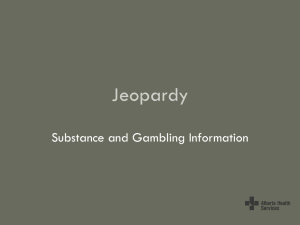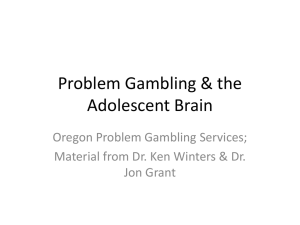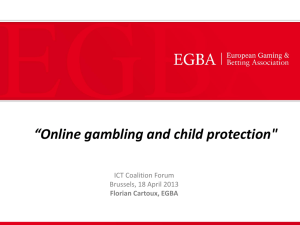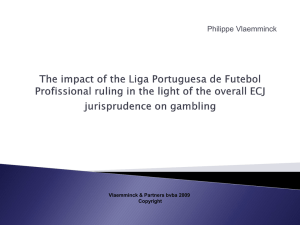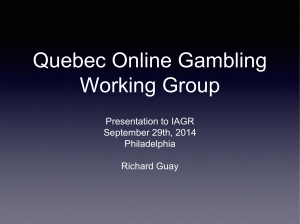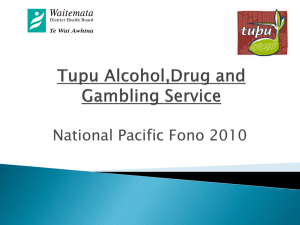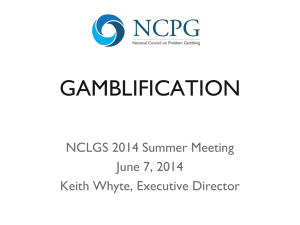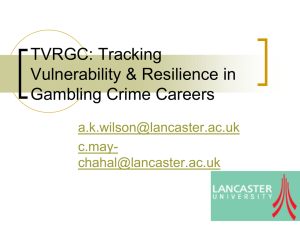Organized crime - University of Massachusetts Lowell
advertisement
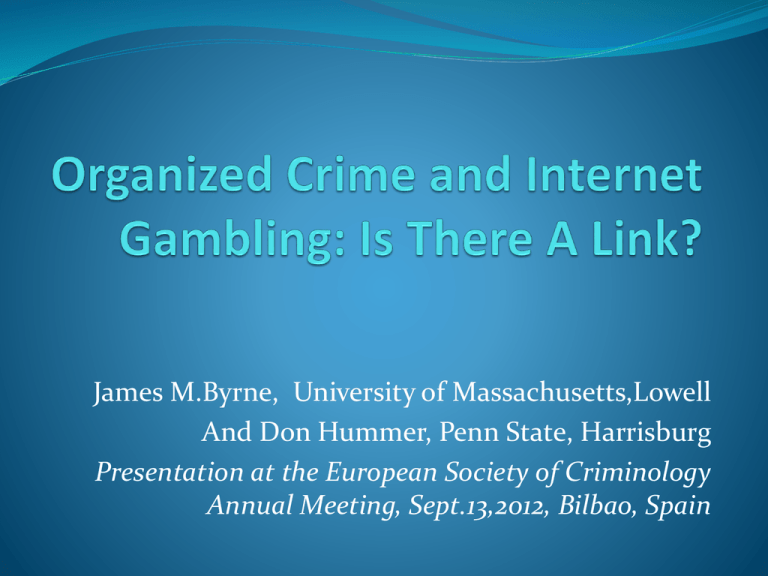
James M.Byrne, University of Massachusetts,Lowell And Don Hummer, Penn State, Harrisburg Presentation at the European Society of Criminology Annual Meeting, Sept.13,2012, Bilbao, Spain Overview of Presentation Organized Crime and gambling: A very brief history New Technology and New Opportunities for crime: the emergence of internet gambling Internet Poker and Organized Crime: A Profile of the Big 3 and Black Friday Criminal Activity associated with internet gambling Organized Crime and Gambling Organized crime and illegal gambling: since it was possible to make bets without paying upfront, this led to loansharking. Organized crime and brick and mortar gambling : In The U.S., it appears that OC involvement in the large gaming establishments ended in the late 1990s.Keep in mind one fact: markers allow you to play without paying first….. Internet Poker and other forms of internet gambling in the United States and globally Prevalence:23 Million people in the U.S. play poker on a regular basis, either in casinos or online( 10.1% of U.S. population)It is estimated that in 2007 alone, 15 million people play online for real money( 2.6% of U.S. population), and approximately 7 million play at least once a month( 1.4% of U.S. population) Market Share: U.S. gamblers represent between ¼ and 1/3 of the global market for online gambling services. Profits/Revenue: The size of the U.S. share of that market was estimated at 5.9 billion in 2008 alone. Criminalization of Internet Gambling in the United States The Unlawful Internet Gambling Enforcement Act(UIGEA) of 2006” mandates that banks and credit card companies halt the use of credit cards for the transmission of internet gambling stakes to overseas sites”( Pontell, Geiss, and Brown, 2011: 25) On April 15, 2011, The DOJ targeted the three largest internet poker sites—Poker Stars, Full Tilt Poker, and Absolute Poker—and charged the heads of these companies with violating the UIGEA. The domain names of the three sites were seized and as a result, online poker playing by U.S. citizens has been blocked. April 15, 2011 is now called BlackFriday. Specific Charges in Black Friday federal Indictment Bank fraud: They tricked some banks into processing transactions; they bribed some banks to process transactions. Money laundering: arranged for the money received from U.S. gamblers to be disguised as payments to hundreds of non-existent online merchants purporting to sell merchandise such as jewelry and golf balls. Illegal gambling offenses: ran a gambling business Who are the Big 3 Owners? Full Tilt Poker: FTP was started by a group of professional poker players, including Phil Ivey, Howard Lederer, and Chris Ferguson. Named in indictment: RAYMOND BITAR(US) and NELSON BURTNICK(Can) Poker Stars: PS was started by a father and son team in Canada, but they hold a banking license from the Isle of Man. Named in indictment: ISAI SCHEINBERG(Canada) and PAUL TATE ( Isle of Man) Absolute Poker: SCOTT TOM and BRENT BECKLEY( U.S citizens reside in Costa Rica) Isai Scheinberg – PokerStars.com * Founded in Richmond Hill, Ontario, Canada. Locus of operation, Isle of Man. * Estimated Player Deposits as of Black Friday indictments = > $500 million US • Charges against Scheinberg were actually a Class A misdemeanor in New York state for operating illegal games of chance since the UIGEA does not contain specific provisions prohibiting poker • Scheinberg settled the US civil complaints against PokerStars by paying an undisclosed fine & acquiring the debt associated with FullTilt. • Many observers feel the government case against Scheinberg and his companies is simply an effort to tax a quasi-legal entity that accrues at least hundreds of millions in US $ per annum Raymond Bitar – FullTilt Poker * Founded in 2004. Locus of operation: Channel Islands. Relocation to Isle of Man & Malta after acquisition by PokerStars * Assets as of Black Friday indictments are unknown, but corporation was unable to settle $350 million US in player accounts Accusations against Bitar & others allege FullTilt ran a Ponzi scheme to bring cash into the company and pay officer salaries In July 2012, Bitar was formally chargesd with money laundering and conspiracy to commit bank fraud. He has pled not guilty and is free on $2.5 million US bond while awaiting trial. He faces a maximum of 145 years in prison if convicted of all charges against him. Brent Beckley – Absolute Poker/Cereus * Founded in 2003. Locus of Operation – Aruba * Several officers have been connected to organized crime entities in Aruba and elsewhere as well with corrupt government officials Beckley was charged on Black Friday with, and subsequently pled guilty in December 2011 to, bank fraud, wire fraud, and violating the UIGEA. In July 2012, He was sentenced to 14 months imprisonment to commence no later than October 1, 2012. Beckley’s half brother and co-owner of Absolute, Scott Tom, was indicted on similar charges, but his whereabouts are unknown. Absolute Poker/Cereus entered liquidation in October 2011 Online Gambling and The Rake: the cost of making a bet online Raking Profits:“Of the billions of dollars in payment transactions that the Poker Companies tricked U.S. banks into processing, approximately one-third or more of the funds went directly to the Poker Companies as revenue through the "rake" charged to players on almost every poker hand played online”( Federal Indictment) Organized crime groups would certainly be interested in this type of business opportunity—but so would legitimate business groups. International Law Challenges IS it really a crime? U.S. is criminalizing behavior that is legal in most other countries. Control: If the company is not physically located in the U.S., how can we regulate it? Why criminalize? Is the real issue here outsourcing of jobs—and revenue– rather than the behavior itself? International Case Law: Antigua took the U.S. to court in 2003 and won a decision at the World Trade Organization in 2004. Issue: Disguised restraint of trade: gambling legal in U.S. in every state except Utah and Hawaii( Pontel, Geis and Brown, 2011). Intra-State Law Challenges Conflicting Laws: Several States have either passed or have legislation pending to legalize intra-state gambling, with the prospect of increased tax revenues for the state. Pending Conflicts between Federal and State Lawmakers: It is unclear whether state laws allowing intra state gambling conflict with the current federal laws prohibiting interstate/ internet gambling. Who are the online players? Prevalence:23 million play poker; 15 million play online, about 7 million play online for money at least once per month. Profile: 76% male, 58% under 35 years old Research on online gambling patterns: A variety of behavioral tracking tools are currently used by the industry to examine player gambling patterns, such as PLayScan, developed by a Swedish gaming company. At present, we know more about players outside than inside the United States. The Organized Crime Connection: Myths and Realities Myth: An examination of the profiles of the Big Three Internet Poker Companies does not reveal any obvious organized crime connections for two of the big 3. Realities: one of the big 3—Absolut Poker—has been linked to organized crime. Organized crime groups have been linked to a wide range of criminal activities related both to the operation of the sites and to the actual gaming activity. Individuals with known links to organized crime have been arrested in the United States for a variety of crimes related to internet gambling. Potential Risks Associated with Internet Gambling: Are they Real? A Review of the Available Evidence 1. Gambling by minors 2. Organized crime and online gambling 3. Criminal and fraudulent behavior 4. Network access, data privacy, and security issues 5. Problem gambling 1.Research on Internet Gambling by Minors Prevalence: The evidence to date suggests that kids gamble, with a significant number gambling online. Problem Gambling: a “ small subgroup of these adolescents( 4-7%) exhibit serious patterns of pathological gambling, and another 10-15% were at risk of either developing or returning to a serious gambling problem”( Sparrow, 2010:16). Preventing online gambling by minors: Owners claim that they have technologies in place to control access points and limit online gambling by minors. 2. Online Gambling and Organized Crime Prevalence: no definite review of the possible organized crime link to the major online gambling sites has been conducted to date Regulation: Many countries that license online gambling conduct background checks on the principles of online gambling sites, looking closely for possible ties to organized crime. The gambling-organized crime link: It has been argued that organized crime has been forced out of the casino business. Organized Crime and Internet Gambling New Technology, New Opportunities for organized crime: It has been argued that organized crime has been forced out of the casino business, but some commentators have suggested that organized crime involvement in gambling has likely moved from the casino to the internet. Organized Crime Research: no definite review of the possible organized crime link to the major online gambling sites has been conducted to date. Preventing Potential organized crime control of internet gambling: Many countries that license online gambling conduct background checks on the principles of online gambling sites, but……. there has not been a detailed assessment of the effectiveness of these prevention strategies. 3. Criminal and Fraudulent behavior and Internet Gambling Prevalence: While no definitive estimates on the extent of the problem can be offered, there is a growing body of research on crimes related to internet gambling: Defrauding of consumers by site operators Cheating or defrauding of players by other players Money laundering by players Money laundering by site operators Regulation/control: It has been argued that legalization will reduce the extent of the problem, but there is no current research to support this view from international research. 4. Network access, data privacy, and security issues Problem: It has been suggested that internet gambling poses a range of possible problems, including (1)difficulties in jurisdictional control/ enforcement of local, state, and federal laws, (2) potential data breaches by site operators, and (3) breakdowns in site security that undermine the integrity of the online gambling site Prevalence: No estimates can be offered on the prevalence of these problems, because the necessary research has not been completed. 5. Problem Gambling Prevalence: It has been estimated that a small proportion( less than 1%) of the U.S. adult population has a pathological gambling problem. Will increased access lead to more problem gamblers ? A recent review of the extent of pathological gambling—all forms—among the adult population( 0.7%) in the United Kingdom ( Wardle, 2007)found that the prevalence rates were static and low( 1999-2007), despite increases in gambling opportunities during that period. Potential Benefits of Legalized Internet Gambling: A Review of the Available Evidence (1) Individual Freedom: There is no doubt that the public now relies on the internet and new technology for communication, socialization, and recreation/sport. Placing restrictions on gambling behavior in cyber space while allowing gambling in state lotteries and at casinos will be difficult to justify to a public that has become comfortable in this new environment. (2) New Revenue Streams: Significant revenue is likely to be generated through legalization of online gambling. Sparrow(2009) estimates that 3 billion in annual revenue can be raised by licensing and regulating internet poker alone. However, this estimate is based on research funded by the industry itself. We do not have accurate estimates of total likely revenues, and/or how the expansion of online gambling will effect other gambling options, such as state lottery revenues or casino gambling revenues. It is possible that gains in one area will be offset by losses in another area. (3) Consumer Protection: It has been argued that the best way to control criminal behavior associated with online gambling( and organized crime involvement) is to legalize gambling, but to regulate it closely. Research supporting this argument has not been completed, but the experiences of other countries can and should be examined closely. A Research Agenda on Internet Gambling Research Accuracy: The gambling industry has funded most of the research in this area, raising the usual issues of accuracy/ bias in the findings reported: Research Funding: We need independently funded, objective research on the extent of internet gambling, both in the United States and Internationally, its benefits, costs, and consequences. Two Key Research Questions: (1) What are the costs and benefits of legalization? (2) What are the costs and benefits of criminalization? The Knowledge Gap-Key Research Questions we can not now answer: Prevalence: Who plays poker and other forms of online gambling in the United States? How often do they play? How much do they bet? Who are the winners ? How much do they earn? Who are the losers ? How much do they lose? Revenue Estimates: How much revenue does internet poker and other forms of online gambling generate? Who is making money from internet gambling? What are the states’ revenue estimates associated with the legalization of online gambling? Are they accurate? What is the projected impact of internet gambling on casinos, state run lotteries, and other forms of online gambling? How accurate are these projections? The Knowledge Gap-Key Research Questions we can not now answer: Individual Harm: Does online gambling harm individuals-- and the public-- in any way (e.g. increase in problem gambling or addiction, loss of income, increased social isolation, gambling/ problem gambling by minors)? Community Harm: Is organized crime involved in online gambling directly or indirectly? What is the extent of consumer fraud and other criminal activities related to internet gambling? Can these problems be addressed better by legalization or criminalization? Operation, Regulation, and Control: Do some internet gambling sites perform better than others? How can the problems related to fraud and other criminal activities (cheating, money laundering) involving internet gambling be prevented and/or controlled by either legalization or criminalization? What about data privacy/ security ? Key Research Questions: Who plays poker online? How often do they play? How much do they bet? How much revenue does internet poker generate? Who is making money from internet gambling? Will the legalization of online gambling harm individuals-- and the public-- in any way (e.g. increase in problem gambling or addiction, loss of income, increased social isolation, gambling/ problem gambling by minors)? Is organized crime involved in online gambling directly or indirectly? What is the extent of consumer fraud and other criminal activities related to internet gambling? Do some internet gambling sites perform better than others, based on user reviews? Who are the winners in internet poker? How much do they earn? Key Research Questions: Who are the losers in internet poker? How much do they lose? Can the problems related to fraud and other criminal activities (cheating, money laundering) involving internet gambling be prevented through legalization &/or increased self-regulation? What is the projected impact of internet gambling on casinos, state run lotteries, and other forms of online gambling? How accurate are these projections? What are the states’ revenue estimates associated with the legalization of online gambling? Are they accurate?
